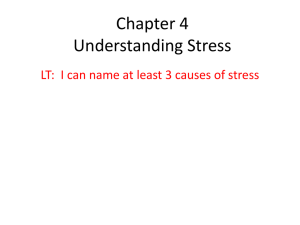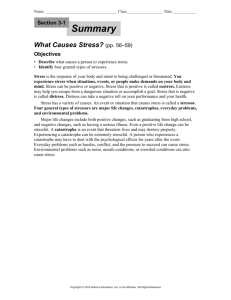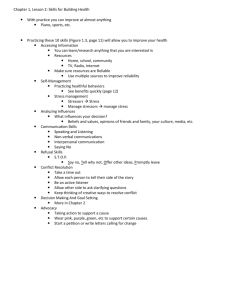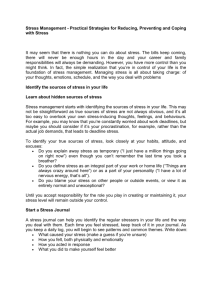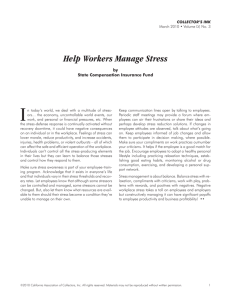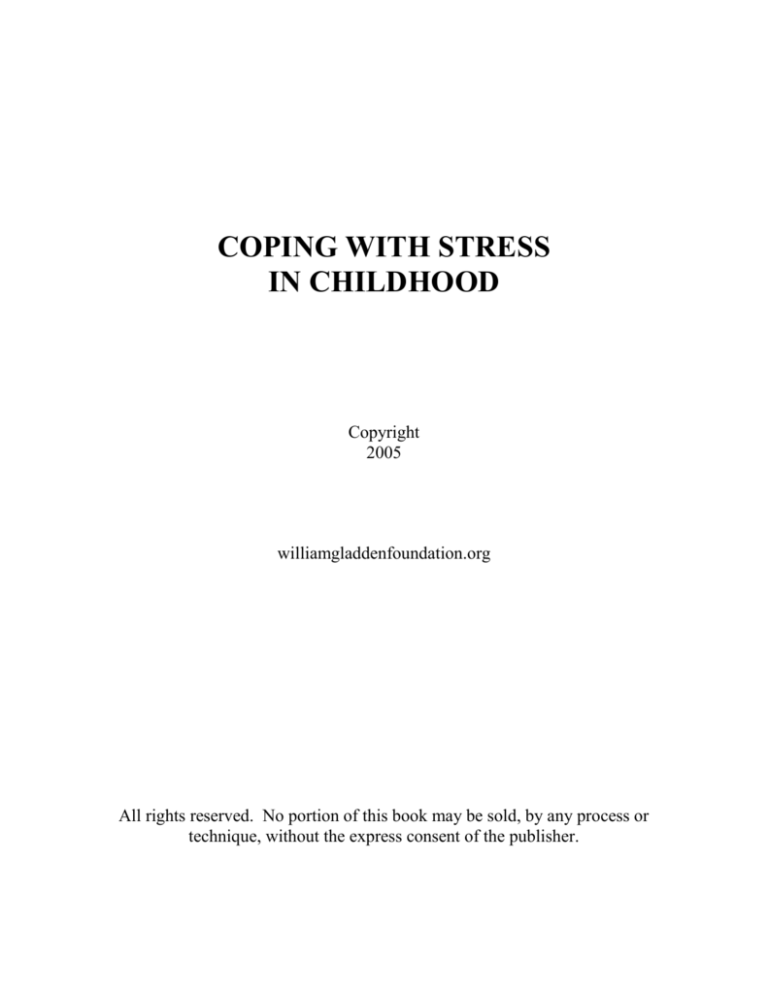
COPING WITH STRESS
IN CHILDHOOD
Copyright
2005
williamgladdenfoundation.org
All rights reserved. No portion of this book may be sold, by any process or
technique, without the express consent of the publisher.
INTRODUCTION
Stress, in some form, is always with us. Sometimes it is a positive force helping us to
survive, to respond to life’s experiences and to generate energy. At other times, stress is
a negative force created by a fast-paced and complicated world that is frequently harsher
than we like.
Life in contemporary society is a competitive, complex and constantly changing
experience. It is a time of having to adapt to the new, the unexpected and the unknown,
which can produce many kinds of pressures. For some people, dealing with these
pressures may simply add pleasure and vigor to their lives. For others, however, the
variety of stresses can aggravate, overwhelm and, ultimately, incapacitate them.
Children, in particular, have difficulty adjusting to change.
Modern life also can be highly stressful for children who complain of boredom,
monotony and frustration because their lives are “too dull.” Such children may be angry,
anxious, low in self-esteem and unable to cope with their daily existence. In addition,
children in today’s world frequently feel as if “there’s nothing to do,” perhaps a reaction
to living with too much media and passive entertainment. It also may be a reaction to
being alone too much, unsupervised and neglected.
In young children, the price of stress usually surfaces in one of two ways: they become
overly quiet and withdrawn, or they “act-out,” often in uncontrolled and explosive
fashions. All over America, at home, school and elsewhere, the price of stress is
enormous. This “price” is evident in absence from school, “dropping out,” poor
academic performance, emotional and behavioral problems. A major price is the
development of poor mental and emotional health, diminishing physical well-being and
inadequate productivity. It also may be apparent in students who become supercompetitive, who try too hard to be the “best” – whether in sports, academics or general
popularity.
-II-
People who suffer from stress feel that they are not in control of their lives. Children
may be victims of inadequate parental guidance and support or too much parental
demand for achievement and superiority. They also may suffer from poor teaching,
uncaring teachers or teachers who demand too much. Young children frequently develop
stress from lack of a stable home life, long absence of either parent and a feeling of being
unloved.
Finally, children and adults are often victims of poor nutrition, lack of exercise, overindulgence in smoking, alcohol or drugs. Perhaps it is time for 1) both children and
adults to develop healthier lifestyles, 2) industry to become more alert to how its
demands affect employees and their families, 3) parents to take serious note of what their
expectations are doing to their children and 4) educators to assure that they care as much
about student health as they do about curriculum.
J. Frederick Garman, Ph.D.
Charlotte G. Garman, Ed.D.
William Gladden Foundation
-III-
TABLE OF CONTENTS
QUESTIONS AND ANSWERS
What Is Stress?.....................................................................................................................5
Could We Do Without Stress?.............................................................................................5
Can We Avoid Stress?.........................................................................................................5
Where Does Stress Come From?.........................................................................................5
When Does Stress Become A Problem?..............................................................................5
What Are Some Symptoms Of Too Much Stress?..............................................................6
What Is The Most Serious Result Of Negative Stress?.......................................................6
Does Everyone React To Stress In The Same Way?...........................................................6
What Is The “Fight Or Flight” Response?...........................................................................6
What Major Stresses Cause Us To Fight Or Take Flight?...................................................7
What Major Stressors Do Children Face?...........................................................................7
What Role Does Personality Play In Stress?.......................................................................7
What Kind Of Person Seems To Suffer The Least Stress?..................................................7
How Does Stress Negatively Affect Children?...................................................................8
Does The Use Of Stimulants And Other Drugs Affect Stress?...........................................8
What Happens To These Young People?............................................................................8
What Is Stress-Management?..............................................................................................8
How Can Stress-Management Programs Help Children Cope?..........................................8
CAUSES OF STRESS IN CHILDHOOD..…………………………………………….9
SYMTPOMS OF STRESS IN CHILDHOOD………….…………………………….10
STAGES OF COPING WITH STRESS…..……….……………….…………..……..12
WAYS TO COPE WITH STRESS………………………............................................14
HOW PARENTS CAN REDUCE STRESS FOR THEIR CHILDREN…..……..…15
PROFESSIONALS TO CONTACT FOR HELP IN COPING WITH STRESS......16
-IV-
WHAT IS STRESS?
Stress is the body’s response to demands on it, both enjoyable and threatening. Stress is
an internal chemical reaction that is non-specific, one that prepares us for “fight or
flight,” and allows us to adapt or resist to changing stimuli. These STIMULI are simply
the many and varied events of our daily lives.
COULD WE DO WITHOUT STRESS?
NO, we could not do without stress. Stress is necessary for life. In fact, we need a
certain amount of stress to be healthy. Humans need stimulation to function. Stress, as
stimulation, helps us to live an active – as opposed to passive – existence. It makes us
change thought into action, whether we are running a race, playing an instrument,
planning a party or getting married.
CAN WE AVOID STRESS?
NO, we cannot avoid stress because it is an automatic part of life. The body’s stress
reaction is the same whether it results from a scare or a kiss. Both a scare and a kiss are
“stressors.” STRESSORS are things that bring about the body’s response. It is wise to
be conscious of both positive and negative stressors. Being alert to stress, its causes and
symptoms, can help us cope with it.
WHERE DOES STRESS COME FROM?
Stress comes from “stressors.” Stressors are all around us. Some stressors are
environmental (being too hot or too cold). Others are attitudinal (how we react to a huge
homework assignment or an unannounced test). Stressors also can result from
relationships – both good and bad (a date with someone special or a fight with parents).
Stressor can be small events or incidents of grave importance.
WHEN DOES STRESS BECOME A PROBLEM?
Stress becomes a problem only when it becomes “distress.” DISTRESS is the result of
too much stress and our inability to cope effectively with it. This over-abundance of
stress may be the result of only one event or a combination of experiences.
-5-
WHAT ARE SOME SYMPTOMS OF TOO MUCH STRESS?
It is often difficult to determine if someone is experiencing too much stress until that
person reaches the stage of exhaustion, mental or physical collapse. There are, however,
some physical, psychological and emotional signs that may indicate stress overload.
PHYSICAL SYMPTOMS include stomachaches, ulcers, headaches, backaches,
insomnia and restlessness. PSYCHOLOGICAL SYMPTOMS include over-reactions,
indecisiveness, short-term memory loss, anxiety and uncustomary aggressiveness.
EMOTIONAL SYMPTOMS include changes in behavior, mood swings, outbursts,
anger, impotence and depression.
WHAT IS THE MOST SERIOUS RESULT OF NEGATIVE STRESS?
The most serious result of negative stress is the inability to cope with life, followed by
suicide. High school students are the highest suicide risk group, followed by young
adults between the ages of 17 and 26. Young people in these groups average 19 deaths
due to suicide per 100,000 people, plus numerous suicide attempts.
DOES EVERYONE REACT TO STRESS IN THE SAME WAY?
NO, humans vary in their reactions to stress. Some people thrive on having many
responsibilities; others tremble at the thought of going to school or to work. Some people
can handle and enjoy several assignments; others are overwhelmed with one. A grumpy
friend or teacher does not upset some people; others have tremendous trouble tolerating
such difficult dispositions. However, when “stressed,” we all react, to some degree, with
a “fight or flight” response.
WHAT IS THE “FIGHT OR FLIGHT” RESPONSE?
Put simply, the “fight or flight” response is the reaction we experience when we perceive
a need to protect ourselves. During prehistoric times, it allowed early man to escape
from danger. Although we do not have saber-toothed tigers chasing us today, we do face
other stresses. Modern-day humans have an internal capacity for responding to stressors.
That capacity consists of three stages. The ALARM stage is the “call-to-arms of the
body’s protection systems. The RESISTANCE stage is the body’s “fight” to withstand
or “flight” to escape the threat and return to normal once it has passed. EXHAUSTION
is the stage in which the stress is too prolonged and difficult to overcome and the body
breaks down.
-6-
WHAT MAJOR STRESSES CAUSE US TO FIGHT OR TAKE FLIGHT?
Modern society has few wild beasts to frighten us, but we do have such “demons” as
divorce, abuse, poverty, malnutrition, alcohol, drugs, crime, racism, rape, homelessness,
hunger, failure and violence. Any one of these problems can cause people to “fight” or
take “flight.”
WHAT MAJOR STRESSORS DO CHILDREN FACE?
Everyone faces six major stressors, and neither children nor adults can escape them. 1)
CHANGE – makes us take risks and adapt to something new. 2) PERFORMANCE
(how we are doing at work, school or home) creates tension and affects our confidence.
3) FEARS (whether real or imagined) affect our physical or mental health. 4)
BOREDOM, APATHY AND DEPRESSION often give us poor self-image and a
feeling of isolation. 5) GRIEF is very stressful and can lead to physical and mental
breakdowns. 6) THREATS cause adverse reactions to the body and mind.
WHAT ROLE DOES PERSONALITY PLAY IN STRESS?
Personality largely determines how we react to life’s many and varied experiences. The
root of personality is the value system learned during childhood. The way we act or react
influences how we see ourselves and perceive our surroundings. When our outlook is
negative, we can expect to suffer stress. Conversely, when our outlook is positive, we
can expect to cope with stress in a healthy manner.
WHAT KIND OF PERSON SEEMS TO SUFFER THE LEAST STRESS?
People who like themselves and their lives are usually strong in the face of any trying
experience. They have self-confidence. They do not feel as if they are victims of life and
bear little resentment. They have few fears and anxieties and tend to enjoy confronting
and conquering problems.
-7-
HOW DOES STRESS NEGATIVELY AFFECT CHILDREN?
Numerous stressors affect today’s children. They juggle diverse roles and responsibilities
such as school, homework, extracurricular activities, jobs, friendships and household
chores. They face peer pressures such as alcohol, drugs, gangs, dating and sex. They are
expected to excel academically, athletically and socially. These many and varied
demands can create tremendous stress and negatively affect children. As a result, some
children combine activities such as listening to music while studying. Many do with less
sleep. Others take a variety of stimulants to “keep going,” or other drugs to “escape.”
DOES THE USE OF STIMULANTS AND OTHER DRUGS AFFECT STRESS?
Constant use of stimulants and other drugs destroys physical health and mental stability.
Drugs, of course, are killers, but there also is danger in coffee, soft drinks containing
caffeine and mega-doses of vitamins. More seriously, the use of “street drugs” can lead
to the “exhaustion” stage of stress. Children who use drugs soon lose their ability to
“fight” and their bodies, facing prolonged stress, demand more and more drugs. What
may have been taken initially as an escape from stress soon becomes a major stressor.
WHAT HAPPENS TO THESE YOUNG PEOPLE?
The use of stimulants or other drugs, loss of sleep and doing too many things at once, in
the long haul, will seriously affect health. Most young people are only fooling
themselves if they think they can continue in this pattern of living. Performance is
affected, intellectual ability diminishes and lethargy sets in. These factors can be the
beginning of “dropping out” or of being “stressed out.”
WHAT IS STRESS-MANAGEMENT?
Stress-management is a group of ideas and methods useful for easing stress. They may
include becoming aware of how we react to stress, finding a support system or person,
talking about problems, re-thinking reactions to daily experiences, relaxing, changing
diets and harmful habits and exercising. If we do these things, our self-concepts
automatically improve and we find ourselves “managing” life better.
HOW CAN STRES-MANAGEMENT PROGRAMS HELP CHILDREN COPE?
Stress-management programs range in scope and emphasis. One program helps children
realize the difference between positive and negative bodily stress and know how to react
to stressful situations. Another program convinces youth of their ability to take personal
responsibility for their health and well-being by teaching them about the relationships of
their life-style to their own state of mental and physical health. Still another program
emphasizes self-control as a stress-management skill, and has had the unusual result of
not only improving reactions to stress, but, also, the academic achievement of students.
Stress control resulted, also, in improved general behavior.
-8-
CAUSES OF STRESS IN CHILDHOOD
Today’s children are living in the “age of stress.” CHANGE is a main cause of stress:
changes within the family and changes within the person. The more dramatic these
changes are, or the greater their number, the higher the potential for stress. The following
list contains some of the more common causes of stress in childhood.
Academic problems
Alcohol abuse by family member(s)
Physical and emotional changes experienced in puberty and adolescence
Domestic violence
Drug abuse by family member(s)
Emotional or psychological problems by family member(s)
Excessive discipline by parents
Family crises
Family financial problems
Family tensions
Fear of failure
Illness or death of a close friend
Illness or death or a family member
Inadequate housing
Inconsistent parental discipline
Lack of effective communications between family members
Living in a dangerous neighborhood
Living in a single-parent household
Moving or changing schools
One or both parents frequently absent from home
Overcrowding at home
Parental separation or divorce
Parental stress
Peer pressures
Personal health problems
Personal setbacks, disappointments or embarrassments
Physical deformities
Physical or emotional neglect
Physical, sexual or psychological abuse
Racism
Rejection by family members, friends, peers or others
Ridicule by family members, friends, peers or others
School or athletic performance anxieties
Sexual impulses
Unrealistic parental expectations or demands
Unrealistic teacher expectations or demands
-9-
SYMPTOMS OF STRESS IN CHILDHOOD
The following is a partial list of some of the more common symptoms of stress in early
childhood and adolescence. Most children will exhibit one or more of these symptoms as
a “normal” part of life. When one or more of these symptoms is chronic, however, there
may be cause for concern. Medical or mental health intervention may prove helpful.
Aggressiveness
Anger
Anxiety
Apathy
Backaches
Bedwetting
Biting nails
Boredom
Changes in behavior
Clenched jaws
Constipation
Crying
Diarrhea
Discipline problems
Dizziness
Delinquency
Depression
Eating disorders
Excessive frustration
Fearfulness
Grinding teeth
Habitual clearing of throat
Headaches
Hostility
Inattention
Indecisiveness
Insecurity
Insomnia
Lethargy
Loss of confidence
Mood swings
Muscle aches
Nightmares
Nit-picking
Outbursts
Pacing or wandering
-10-
Panicky fears
Passivity
Persistent coughing
Persistent fatigue
Picking at skin or blemishes
Poor academic performance
Poor concentration
Poor self-esteem
Pulling or twisting hair
Rapid heartbeat
Rashes and other skin disorders
Restlessness
Reversion to infantile behaviors
Rudeness or use of shocking language
Running away from home
School attendance problems
Self-neglect
Short-term memory loss
Silence
Stomachaches
Stuttering
Suicide thought, gestures or attempts
Tapping fingers or feet
Thumb sucking
Teary-eyes
Temper tantrums
Tics or twitches
Overreaction
Ulcers
Unexplained irritability
Unusual perspiring
Use or abuse of alcohol or other drugs
Violence
Withdrawal
Worrying
-11-
STAGES OF COPING WITH STRESS
Children, as well as adults, cope with stress in different ways. Much depends upon how
we react to adversity in general. Some people learn to conquer life’s adversities; others
succumb to them. The following diagram is a simplified view of the stages involved in
coping with stress, and what can happen at each stage.
(PLACE DIAGRAM HERE)
STRESSOR – All human beings experience daily events that cause bodily reactions.
These events are “stressors” and are the cause of stress.
INDIVIDUAL FACTORS – How people react to these stressors largely depends upon
the following factors 1) their overall physical health, 2) their psychological/emotional
strength, 3) the degree of control they exercise over the event and 4) their perception of
the importance of the event.
ADAPTATION – There are two basic reactions to stress. “Distress” is the unsuccessful
or negative adaptation to stressful events. “Eustress” is the successful or positive
adaptation to stress.
-12-
DISTRESS – For individuals who adapt unsuccessfully to events in their lives, physical
illnesses, emotional breakdowns, fears, anxieties and unhappiness become a way of life.
Because they take “flight” from the stressor in their lives, they tend to move from one
stressful situation to another and are vulnerable to experience a continuous cycle of
failure and distress.
EUSTRESS – Those individuals who succeed in adapting to stress enjoy growthenhancing reactions. They approach stressors as challenges, as opportunities to learn and
grow. In the process of “fighting” stress, they build self-esteem, peace of mind and a
strong sense of physical and emotional well-being. As a result, they are better equipped
to meet and conquer future stressors, to prosper and enjoy life’s many pleasures.
RESOLUTION – Since change begins with the individual, there is hope for even the
most distressed. Conquering stress requires willpower, help from others and, sometimes,
a little luck. Still, what happens depends largely upon the individual and his or her
reaction to stress; to “fight” or “take flight;” to live happily or unhappily.
-13-
WAYS TO COPE WITH STRESS
There are many ways to reduce stress; however, it does require a sense of determination
and optimism, since stress reduction seldom happens immediately or results in complete
elimination of stress. Daily improvement, though, is possible when the following stressmanagement techniques are used regularly.
Begin discussing personal problems with trusted family members, friends or
professionals (verbalizing problems is a first and important step in reducing
stress)
Develop a personal stress-management program
Develop hobbies and special interests (they can help take the mind off personal
problems and reduce boredom)
Eat a nutritional breakfast (the most important meal of the day)
Eat regular meals (breakfast, lunch, dinner)
Eliminate stress-inducing foods (salts, fats, sweets, fast foods)
Engage in daily exercise (exercise is the easiest method of reducing stress)
Get regular and sufficient sleep
Learn to identify the causes of stress (by knowing them it is possible to develop
solutions)
List possible solutions to stressful situations and follow through
Listen carefully to the advice of others and consider the merits of their
suggestions
Practice deep breathing
Practice relaxation exercises
Practice self-control
Reduce the intake of caffeine-laden drinks (soft drinks, coffee, tea)
Reduce the intake of “junk foods”
Seek professional help when unable to cope with stress
-14-
HOW PARENTS CAN REDUCE STRESS
FOR THEIR CHILDREN
Family problems are the largest cause of stress in childhood. Family interactions and
relationships have a profound effect on children and are major determinants of how they
approach and master life obstacles. Children who feel emotionally secure within the
family, and whose parents exhibit “healthy” ways to handle problems, are usually
equipped to deal with stress. Parents can reduce stress for their children when they
practice the following techniques.
Acknowledge and praise children’s positive behaviors, rather than dwell on their
negative conduct
Be a good “role model” for children in how to handle stress
Be aware of sudden or dramatic emotional or behavioral changes in children
Be consistent in the use of rewards and consequences
Be sensitive to children’s needs and problems
Comfort and support children through stressful situations
Develop and maintain a stable home environment with healthy family
relationships
Devote time and attention to children so they feel like “special” individuals
Encourage open and honest communication between family members
Express love and affection to children
Find ways to help children develop and maintain a positive self-image
Help children develop and maintain a routine
Help children develop and maintain a positive attitude
Make certain children get adequate sleep
Practice consistent parenting skills
Provide children with personal space and personal time
Seek professional help for any family member who is having trouble coping with
stress or other problems
Set reasonable expectations for children to meet
Spend time together as a family
Teach children about the psychological benefits of physical exercise, deep
breathing and meditation
Teach children healthy ways to handle stress
Teach children the benefits of discussing their problems with others and
considering their suggestions
Teach children to value optimism
Teach children to think about alternative solutions to problems
Teach children to eat healthy foods and regular meals
-15-
PROFESSIONALS TO CONTACT FOR HELP IN
COPING WITH STRESS
The following is a list of agencies and professionals to contact for help or information
about coping with stress in childhood. The first list contains local agencies and
professionals to contact for direct help. The second list contains national agencies to
contact for information.
LOCAL AGENCIES AND PROFESSIONALS
SCHOOL PSYCHOLOGIST OR COUNSELOR – Most schools have at least one
psychologist or counselor on staff. These professionals can help students identify the
causes of stress and provide approaches to resolve them.
Telephone #
FAMILY DOCTOR OR PEDIATRICIAN – Children who display intense reactions to
stress may benefit from a physical check-up. These medical professionals also can help
identify the cause of stress and prescribe medicines or techniques to remedy symptoms.
Telephone #
MENTAL HEALTH CENTER – Most communities have a mental health center where
trained professionals are available to help individuals or families understand how to cope
with emotional problems, including stress. They also can make referrals to other mental
health professionals who specialize in stress-related disorders and their management.
Telephone #
PSYCHIATRIST, PSYCHOLOGIST OR COUNSELOR IN PRIVATE PRACTICE
– These mental health professionals can help determine the causes of stress and provide
services or techniques designed to reduce or resolve the causes and effects of stress.
Telephone #
NATIONAL AGENCIES
The American Institute of Stress
www.stress.org
Teach Health
www.teachhealth.com
Kids Health
www.kidshealth.org
-16-

